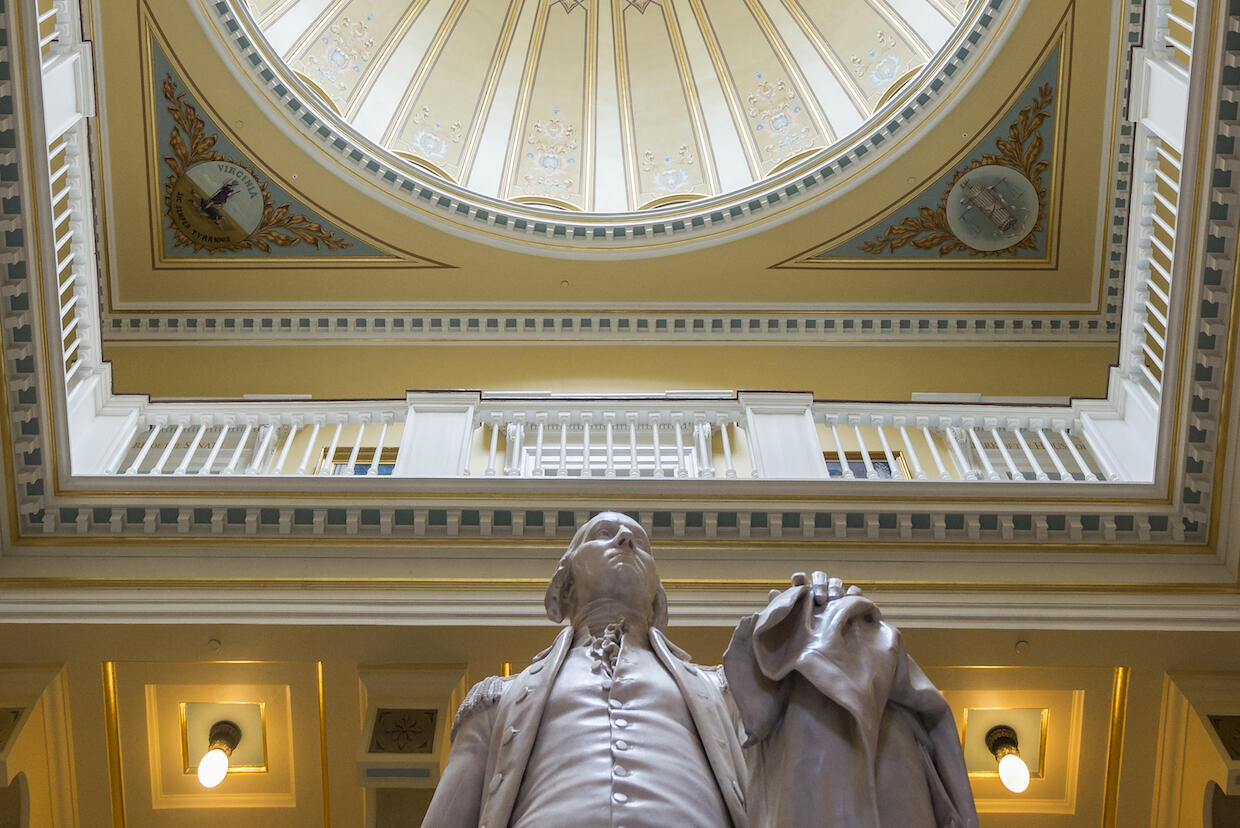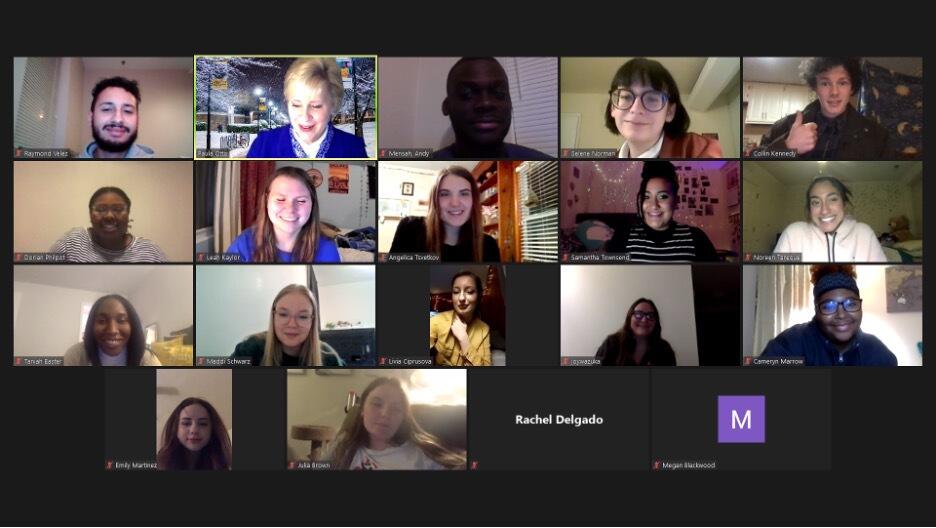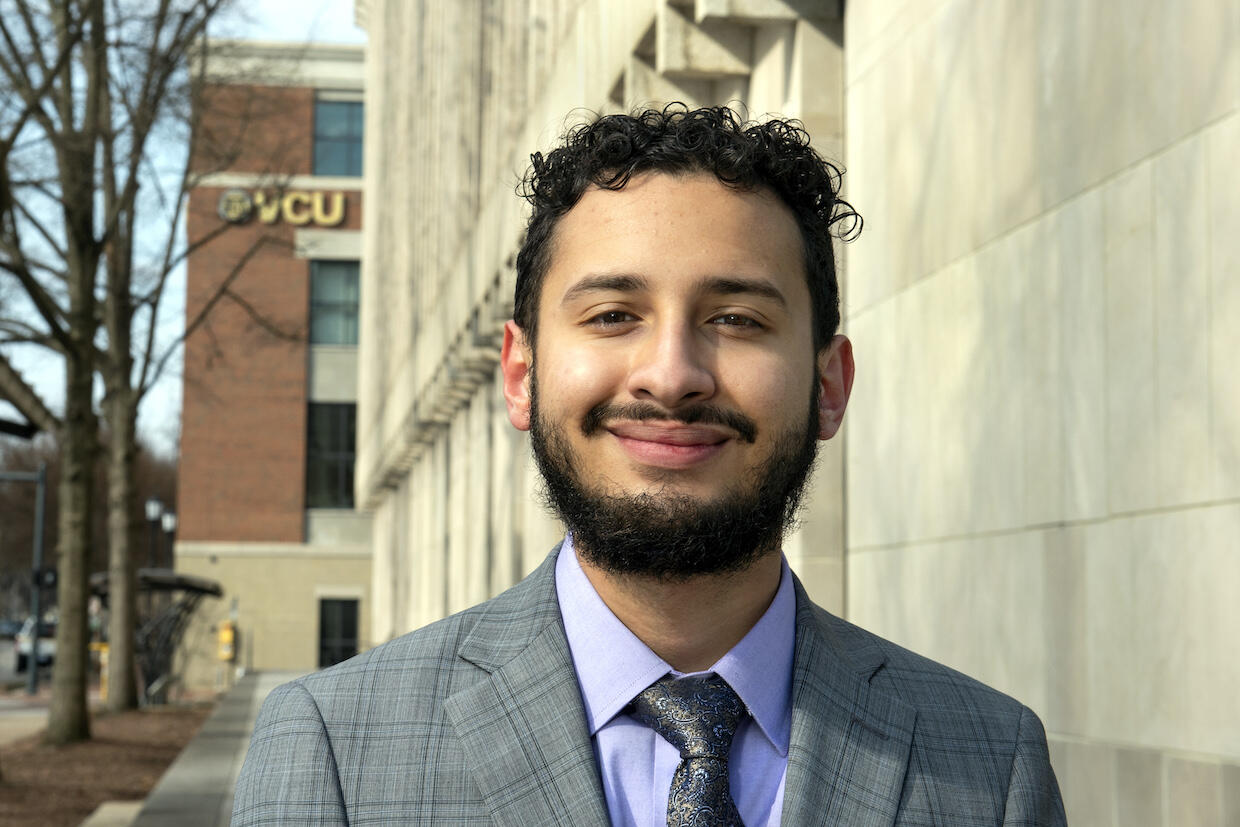
Feb. 11, 2021
At the General Assembly (sort of) with VCU’s capitol semester students
Interns at the Virginia State Capitol this legislative session are doing most of their work virtually. It’s still “a very cool experience,” they said.
Share this story
Cameryn Marrow has never set foot in the Virginia General Assembly, but on Tuesdays and Thursdays the Virginia Commonwealth University junior may represent state delegate Alex Askew (D-Virginia Beach) at certain committee meetings when he has another commitment during the 2021 legislative session.
Marrow, a political science major in the College of Humanities and Sciences, has had a chance to step into the political realm from her Henrico County home as part of the Virginia Capitol Semester internship program, offered every spring through the L. Douglas Wilder School of Government and Public Affairs. However, the program is virtual this year because of the COVID-19 pandemic. The House of Delegates sessions are also virtual. The state Senate sessions are in person at the Science Museum of Virginia but most committees and other meetings are virtual.
Marrow, who also works full time at Capital One, takes notes at these meetings and then reports back to her supervisor, Askew’s legislative assistant.
“I also do some really cool research on bills that [Askew] wants to support or he wants to present as his own,” Marrow said. “On one of my first days, a really cool assignment I got to do was research on asthma inhalers and why insurance companies … would not want to put a price cap on asthma inhalers. [Askew’s] bill was advocating for a price cap on asthma inhalers if you're insured. I learned some really cool things about the history of asthma inhalers in the United States and why their prices are so high.”
“Cameryn is very intelligent with policy and in the political field. That's something that our office really appreciates,” said Logan Kapil, Marrow’s supervisor. For interns at the General Assembly, Kapil said, “there's really no day that's the same, depending on what has to be done. I would say the tasks that are consistent on a daily basis, whether it's in person or working virtually, is handling a lot of our constituent communication. We try to get them really involved and basically learn as much as possible.”
Even in the virtual setting, Marrow enjoys the camaraderie and close communication of Askew’s legislative team.
“I'm an African American woman, so social justice and environmental issues are very important to me. So when I found out who my delegate was [for my internship], I looked him up and he pretty much aligns with just about everything that I would say that I advocate for and that I believe in,” said Marrow. “He's also a Black man. I thought that was really great to be able to work with someone who leads the team as a person of color in the political realm, because that's not something that's always been common. And so I was very fortunate and very lucky to be able to work [with] him and see what it's like being a Black person in that type of space.”

The legislative process … from afar
Like Marrow, the 23 other students in the Virginia Capitol Semester are matched with delegates and senators with whom they share an interest, from business to public safety. This is a smaller group than in the past (last year had 48 participants, with 59 at its highest point), but it is still diverse, and includes many students who are not from the Wilder School. VCU students have been interning and learning at the General Assembly though the Virginia Capitol Semester since 2006.
The virtual nature of the internship this year necessitated more training in the Government and Public Affairs 494 course that acts as an orientation to the internship, and facilitates students’ professional development.
“When it came to preparation for students … there was a lot more deliberate conversation concerning professional communication and the hours that students would be maintaining because all of it is going to be done in the students’ personal environment,” said Ashley Harrison, assistant director at the Wilder School who interviews applicants and matches students with General Assembly members. “So we have a lot of conversations about how to engage professionally in a virtual space, like making sure your [video] background is set up.”
Harrison teaches GVPA 494 with Shajuana Isom-Payne, assistant dean of student services for the Wilder School.
A Monday evening seminar class (GVPA 423) provides more knowledge on the workings of state government, diving into theory and offering a diverse lineup of guest speakers from the governor’s office to lobbyists — and Douglas Wilder himself.
“What I do on the class side is a combination of four critical skills, like using the tools to track legislation, understanding what a fiscal impact statement is, looking at the Virginia constitution and the House and Senate rules,” said Paula Otto, senior director of special projects at the Wilder School and instructor of the Virginia Capital Semester seminar course. “It’s getting into the nitty gritty of how the legislature works.”
Otto acknowledges the virtual setting doesn’t allow for interns to work shoulder to shoulder with their supervising legislative assistants or have casual interactions with other interns and the many people who work and lobby at the Capitol.
“The students have embraced the virtual internship and have adapted to it,” said Otto, who has taught the course since 2019. “And this goes to Shajuana [Isom-Payne] and Ashley [Harrison’s] training on that virtual world. The students have to assert themselves, ask for work and be observant about what's going on in the office. I've been really impressed.”

‘A very cool experience’
During Raymond Velez’s placement with Del. Patrick Hope (D-Arlington), a town hall on the coronavirus vaccine became a flashpoint when hundreds of angry constituents attended, demanding answers after thousands of vaccine appointments were suddenly canceled.
“During the event [Hope's legislative assistant] was inundated with hundreds of questions so on the Monday that followed, she asked me to watch the recording of the town hall to get all the information necessary to answer the questions coming to our office,” said Velez, a junior homeland security and emergency preparedness major. “I've always had some type of interest in government. When I graduate, I want to go to a graduate school for a master's of public administration. So I felt that this internship would give me my first glimpse into public administration.”
When Velez applied for the internship, on his application he talked about policy issues related to gun safety and restrictions. Hope chairs the public safety committee.
“For one of my first assignments I had to do background research, similar to when the National Guard was sent to D.C. for the inauguration and they had to remove 12 people after they did their personal audits,” Velez said. “So to coincide with that, Delegate Hope is trying to propose a similar type of background investigation to happen inside of the Virginia State Police. So he asked me to draft a letter to the superintendent, who's the leader of the Virginia State Police.”
Selene Norman, a junior political science major with a concentration in civil rights, has lobbied for health care issues in the Florida legislature and is interning for Del. Eileen Filler-Corn (D-Fairfax), the Speaker of the House. Norman is monitoring a bill banning plastic foam.
“To see a legislative session where representatives and constituents are able to agree and disagree on an issue and then to see their issue being passed; and then writing that letter about it so that constituents can get it, it was a very cool experience and a very cool process to go through,” Norman said.
Tania Easter, a junior criminal justice major who is interning in the office of Del. Vivian Watts (D-Fairfax), is keenly observing how the General Assembly addresses criminal justice reform and climate change.
“With everything that happened [last] year with police brutality and the death of George Floyd, that really sparked me,” said Easter, an aspiring lawyer. ”We need to look at our criminal justice system and change that.”
As the legislative session comes to a close, the VCU students have an assignment to create their own bill.
“From what I've seen, it's actually a lot of planning that goes into the bills that I never actually considered,” Velez said. “One of the most important pieces is the fiscal impact because most of the bills need money to pass, and if the money's not there, then it's just not going to pass.”
Subscribe to VCU News
Subscribe to VCU News at newsletter.vcu.edu and receive a selection of stories, videos, photos, news clips and event listings in your inbox.







